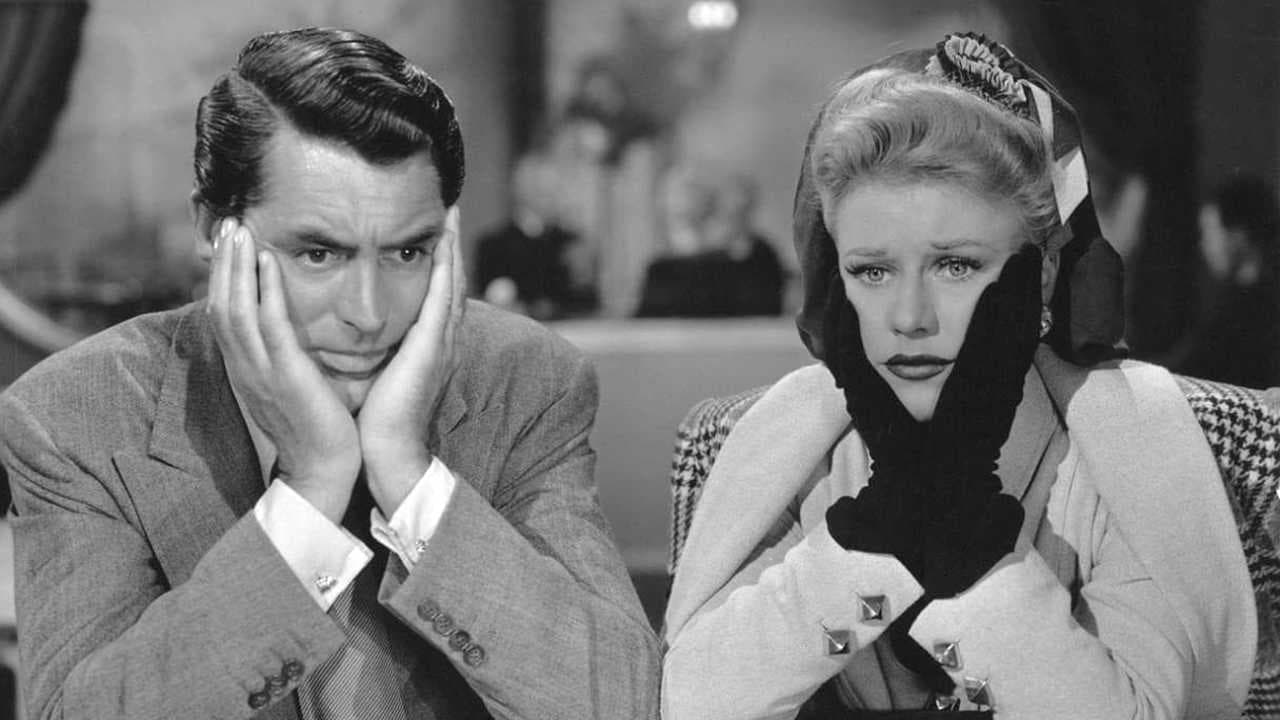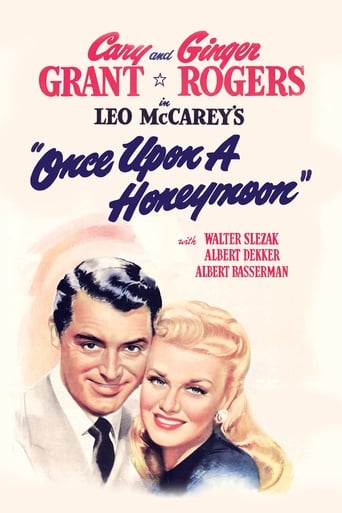

That was an excellent one.
... View MoreIf you're interested in the topic at hand, you should just watch it and judge yourself because the reviews have gone very biased by people that didn't even watch it and just hate (or love) the creator. I liked it, it was well written, narrated, and directed and it was about a topic that interests me.
... View MoreA clunky actioner with a handful of cool moments.
... View MoreIf you like to be scared, if you like to laugh, and if you like to learn a thing or two at the movies, this absolutely cannot be missed.
... View MoreThis film is great because I love Cary Grant, but I was surprised that in 1942 people were making what appeared to be a comedy about Hitler. It seems similar to a comedy being made about Daesh now: the evil that is killing millions of people across Europe was being treated light-heartedly by US film makers in 1942. However, the sense of humour needed to fight a war of that nature probably helped everyone to focus their efforts to defeat the enemy. The characters of the Nazis seems almost humorous, Cary Grant and Ginger Rogers were their usual wonderful selves, and it was very light and enjoyable. I had to look at the date when it was made, in order to understand the context.
... View MoreAmerican burlesque dancer Ginger Rogers jumps at the opportunity to marry a wealthy Austrian baron (Walter Slezak). Little does she know her new husband is a Nazi. Enter radio news correspondent Cary Grant, who falls for Ginger while trying to do a story on her husband. He follows the pair all over Europe. When she's forced to face just who her husband is and what is really going on in the world, Ginger decides to flee with Cary. A wartime romantic comedy directed by Leo McCarey with two of my favorite stars, Cary Grant and Ginger Rogers. Sounds amazing. Unfortunately it isn't without flaws. But first, some of the good. Cary is charming as ever and has great chemistry with Ginger. Love the measuring scene. For her part, she's pretty and fun. I'm not sure why she was using that terrible accent early on. Her husband knew she was an American so I don't understand who she was supposed to be fooling. I guess she was supposed to be putting on airs, like some kind of society lady or something. It's pretty weird and never addressed. Walter Slezak makes for a fine villain, as he usually did. Albert Bassermann is great in a brief role.The scenes with Cary and Ginger are what works most in the film, particularly in the first hour. On the downside, when the film awkwardly switches to drama it undoes whatever momentum it has built up. I'm not offended, like other reviewers are, over the use of Nazis and anti-Semitism in a (mostly) light comedy. It was all within context and treated appropriately. However, I do think the movie becomes less interesting and certainly less fun in the second hour as it becomes darker. The fact that it goes on so long is what does it the most harm, though. As it is, it's a flawed film but still worth a peek for fans of Grant and Rogers.
... View MoreLeo McCarey helms this 1942 lark, whose moods and genre conventions---saccharine romance, espionage adventure, screwball farce and war-time propaganda---swing to and fro so regularly that it's difficult to be bored even when the tipping scales of narrative contrivance become somewhat stressful at times. It's soapboxy-er than its early blitheness suggests, and at one point, the customary lead comic duo is mistaken for Jews and have a close shave with quite a grim fate. At times, because of the nonsensicality of the wildly contrived plot, the brashness of swastika hands on clocks and downer developments initially feel mislaid before they're consistently salvaged by a highly competent group of surprisingly naturalistic and genuinely funny performers, but meets its challenges admirably when it matters.Vienna, 1938. Ginger Rogers plays Katie O'Hara, a Brooklyn dancer who's flown off to marry the rich and high-ranking Austrian Baron Von Luber, a Nazi VIP on the sly, for status and prosperity. Chin dimple extraordinaire Cary Grant plays hyper-transatlantic correspondent Pat O'Toole, who receives a job as a radio commentator to obtain a rare interview with the impending baroness to expose the Baron as a Nazi undercover. The Baron is played by Walter Slezak, that indelible character actor who managed to get pigeonholed as cunning Nazis. You may recognize him from Hitchcock's Lifeboat. Pat's not deterred by Katie's unwillingness to be questioned, and manages to meet her posing as a tailor.Obviously, the reporter becomes smitten with Katie and frantically attempts to disabuse her regarding her fiancée. A turning point slams into this happy-go-lucky buffoonery when Hitler takes Austria, and Katie begins to learn the truth about her new husband's dealings. The two brash Yankees team up and go on the lam through Norway, Holland and Belgium before sudden sabotage missions are sprung on them and create grave dramatic tension. "This is the sort of thing that can make a man a Republican!" he huffs.I had my doubts about Ginger Rogers. Not having seen many of her best known films such as those with Fred Astaire, I thought she may prove yet another example of how incomparable Irene Dunne was alongside Archie boy. About forty minutes into Once Upon a Honeymoon, I was firmly disabused of my presumptions. She has an inborn knack for being natural in a way that even transcends the stagy tenets of the Golden Age, saying a lot without saying much, and saying something different with her face than what she's saying with her mouth. I can't say this excuses the inanity of Archie earlier on managing to trick her so effortlessly into thinking straight vodka is a glass of water, but overall, she's not an uncomplicated Dumb Blonde Type present only to hang off Cary Grant's shoulder. McCarey takes the time to photograph her surprisingly emotive disillusionment about the state of affairs around her.I'm frankly willing to forego any criticisms or dismissals of any moments that border on cornball or lugubrious purely for reward of the scene where O'Toole and Von Luber finally happen upon one another and have a man-to-man sit-down. It's one of those delicately cool scenes where two characters hold their cards firmly against their vests, but say just enough and share just enough sidelong glances to be satisfied of the other's hand. It's an exciting scene that raises the stakes and ratchets up the tension in a subdued, completely unexpected way. In fact, McCarey and his cast are so graceful that it only falls apart when it finally reaches the bungled ending, which I suppose is what happens when you try to balance propaganda and slick storytelling. Regardless, though quite the opposite of cynical or acerbic, it has a streak of the spunk and cunning of a Billy Wilder film, or the "shpontanuity," as one of the Baron's comrades suggests.
... View MoreThis is truly an excellent film. It has everything-comedy, drama, tragedy and a vision of what the world was like in 1942. Let's remember that when the movie was probably being made, the U.S. had not entered the war as yet.It deals with a Brooklyn stripper from Parkside Ave. who lives in 1938 Austria and is about to be married to a high-ranking Nazi. Given her supposed limited intelligence, Ginger Rogers, as this gal, doesn't fully realize what she is getting into. She will be quickly educated by reporter Cary Grant, who is terrific in this role.Walter Slezak plays the heavy in the film and at first is successful in having Ms. Rogers believe that he is an anti-Nazi. No matter where the couple show up, the country soon falls victim to the Nazi terror.The plight of the Jewish people is shown by a maid and her 2 young children, all being Jewish, is helped by Rogers. The maid comes back later on to play a pivotal role when Rogers needs to escape. There is a scene where condemned Jews recite a Jewish prayer. How much more poignant can you get?There is constant intrigue in this film as you begin to wonder the true beliefs of someone who is helping Rogers, while getting her to spy for the allies.The ending may have been somewhat over-the-top, but it did provide for some comic relief to a subject that was very well handled here.
... View More